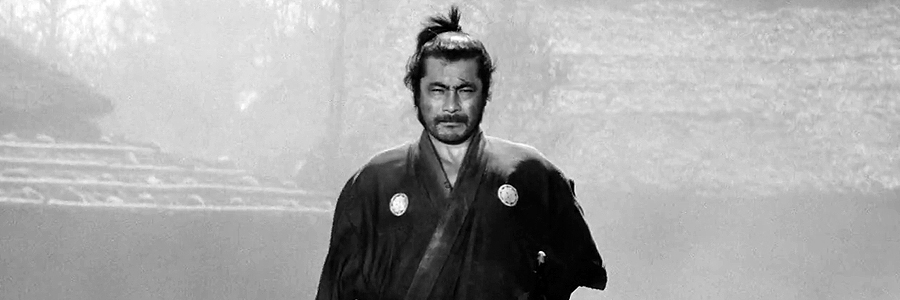
Yojimbo

YOJIMBO (MOVIE)
Toho
Release date: April 25th, 1961
Running time: 110 minutes
Country of origin: Japan
Original language: Japanese
Director: Akira Kurosawa
Writers: Ryuzo Kikushima, Akira Kurosawa
Cast: Toshiro Mifune, Tatsuya Nakadai, Isuzu Yamada

The absence of law and order is always a tempting narrative frame for filmmakers to set their stories in. When morality isn’t bound by a set of rules, individual characters, as well as groups, can be taken to extremes; evil and heroism roaming free while the audience can learn their lessons about right and wrong from comfortable seats. Akira Kurosawa’s period piece Yojimbo takes place in such a lawless microcosm that’s more or less out of the reach of government. The void in this struggling small town is filled by wannabe rulers who set out to claim the territory, but as it’s so often the case, the candidates drift the entire community into a state of gang wars where one can’t remain neutral.
This is the scenery that awaits a wondering samurai (Toshiro Mifune) who becomes our fish-out-of-the-water protagonist as he enters the town in the film’s opening. There’s no doubt that one of the film’s main objectives is to entertain; this is clear when strangers quickly lay out the town’s situation to the samurai and he lays out his intentions to them in return. This brief summary in the first few minutes may seem unrealistic; such talkative characters in the midst of a tense environment where people are often killed in a casual manner for trivial deeds wasn’t exactly within plausible boundaries. None of that really matters; an intriguing picture’s drawn waiting to be filled with the exciting plot.

While watching the film much of my attention went towards trying to figure out whether Yojimbo’s protagonist is a hero or not. The wondering samurai – otherwise known as ronin – who’s also one of the first “men with no name” characters in cinema, certainly isn’t someone who seeks to help the weak or strives to defeat evil. Although he has a moral code of sorts by playing two rival gangs against each other, recognising that the town would probably be better off without both groups, he’s barely more than an opportunist in the first half of the film. This is clearest at the arrival of a single government official to the town that stops a major battle between the two gangs.
The presence of just one official brings immediate order to the town and the samurai is displeased. What would happen if this samurai, who undoubtedly still enjoys some status and respect in spite of being without master, talked to this government official and explained the town’s predicament just as it was explained to him in the opening? My impression was that the government is a powerful force but has limited resources in this world, which is why government officials need to do frequent inspections of rural areas. This was the ronin’s opportunity to bring armed reinforcement to town and quite easily defeat the rival warlords with outside help – but he chose not to.
A character turning point does come however; when he decides to help a farmer and his family, by freeing the wife from one of the warlords’ brother. What almost  becomes the ronin’s downfall begins when he submits to a selfless act of kindness to help others without the prospect of any benefit whatsoever. By this point it’s too late for the town.
becomes the ronin’s downfall begins when he submits to a selfless act of kindness to help others without the prospect of any benefit whatsoever. By this point it’s too late for the town.
While we want this lone samurai to be the likable hero, it’s hard to ignore the fact that it’s his meddling that brings this story to a destructive end. He releases and amplifies the boiling tension beneath the surface and the yield of his actions takes inevitable casualties. It’s impossible to know how things would have turned out in his absence, but things can hardly get worse than the total destruction of an entire town.
Yojimbo therefore does have a hero, but it’s an ambiguous hero at best; his good deeds are overshadowed by his inability to see the escalating consequences of his actions. In the midst of the intriguing plot underpinned by superb performances, Kurosawa shows only a brief period when unconditional peace and order is brought to this troubled world – and that came from government.


Arpad Lukacs
Arpad is a Film Studies graduate and passionate photographer (he picked up the camera and started taking stills just as he began his studies of moving pictures). He admires directors that can tell a story first of all in images. More or less inevitably, Brian De Palma has become Aprad’s favourite filmmaker.
Then there’s Arpad’s interest in anime. He was just a boy when he saw Nausicaä of the Valley of the Wind on an old VHS and was hypnotised by the story of friendship, devotion and sacrifice. He still marvels at the uncompromising and courageous storytelling in Japanese anime, and wonders about the western audience with its ever growing appetite for “Japanemation”.
Have a look at Arpad's photography site, and you can follow him on Twitter @arpadlukacs.
© 2022 STATIC MASS EMPORIUM . All Rights Reserved. Powered by METATEMPUS | creative.timeless.personal. | DISCLAIMER, TERMS & CONDITIONS
HOME | ABOUT | CONTACT | TWITTER | GOOGLE+ | FACEBOOK | TUMBLR | YOUTUBE | RSS FEED
CINEMA REVIEWS | BLU-RAY & DVD | THE EMPORIUM | DOCUMENTARIES | WORLD CINEMA | CULT MOVIES | INDIAN CINEMA | EARLY CINEMA
MOVIE CLASSICS | DECONSTRUCTING CINEMA | SOUNDTRACKS | INTERVIEWS | THE DIRECTOR’S CHAIR | JAPANESE CINEMA





